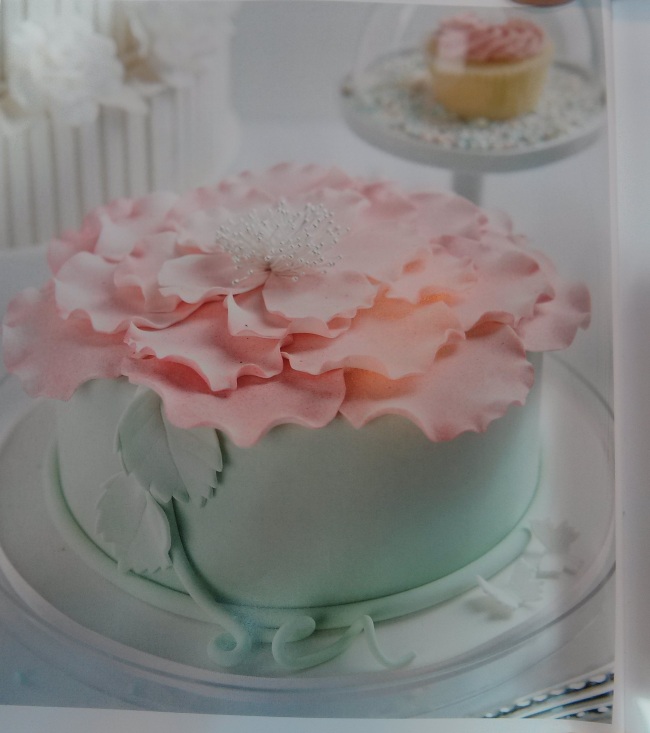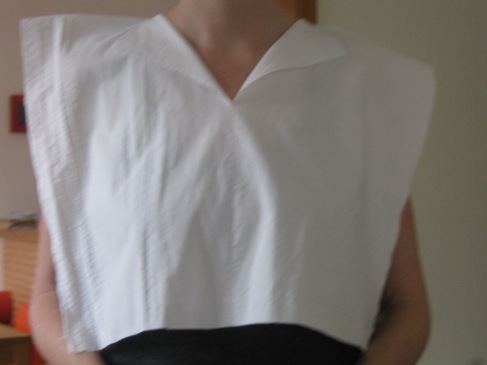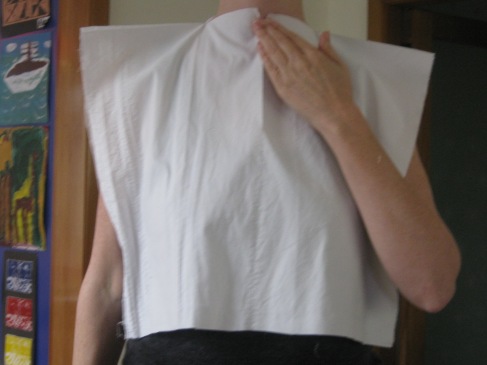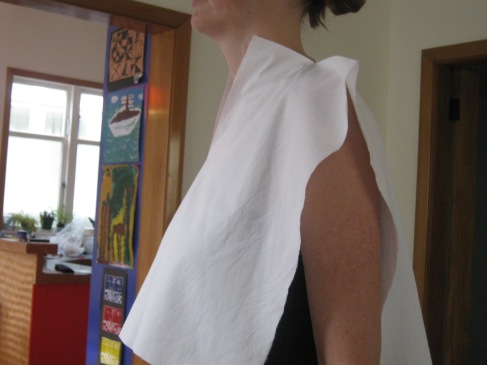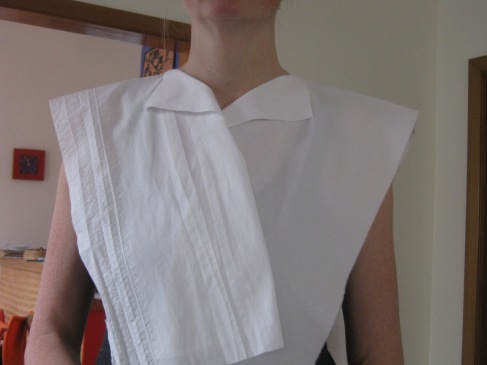When preparing to travel, I suffer packing anxiety: what will the weather be? What sorts of things will I be doing, and what clothes will be appropriate for them?
For this trip to the Caucasus I have lots of meetings; dinners that will be of varying levels of formality; an excursion; and down-time with my daughter. The weather will be in the low 20s (centigrade) some of the time, but in the low teens other times. There’s a chance it may sink as low as 4 for a couple of days, but hard to tell as there’s not a reliable forecast page.
My packing was also impacted by slightly running out of time at the last minute, due to worries about weight and wanting to take as much food as possible to my daughter. So of course at the last minute I didn’t check my packing list and forgot a few items that I really wanted to bring – my togs, my sunglasses, accessory necklaces.
Here are the clothes that I brought:
Tops:
Blue-grey ruffle-neck top
Red cotton square neck top
Navy cotton square neck top
White ruffle shirt
Pink silk sleeveless top
Navy velvet cami
Red lace overtop
Teal ISAK T-shirt
Bottoms:
Grey trousers
Maroon trousers
Jeans
Blue and red Kathmandu peplum hem skirt
Grey velvet skirt
Navy slip dress (Zambesi)
Top layer:
Pale blue jacket
Blue batwing cardigan
Grey/black blazer
Silver lurex cardigan
Navy merino jacket cardigan
Shoes:
Black flats
Nude flats
Brown boots
Silver Witchery flat satin sandals
Underwear etc:
Control underwear top and bottom
Cream thermal bottoms
Cream sleeveless merino undershirt
Purple merino tank
Nude, purple, red bras
Black x5 White x2 wool x1 underwear
Navy, nude, black tights
Black x2, red wool, in-flight, navy wool socks
Outer layer:
Pale blue hat
Eggshell scarf
Navy gloves
Raincoat
Down jacket (can be layered under the raincoat)
So the question is: which of these did I actually wear?
On the plane:
Grey trousers, cream thermals, navy square neck top, navy merino cardigan jacket, (dark grey) inflight socks, black flats, purple bra.
– This outfit looked good but was not quite right in two respects:
1. I opted for the navy square neck top because it’s cotton and I was worried about getting too hot during transit in Doha. That was a fair concern, but instead I ended up cold and smelly. Assuming it’s thick enough to be decent when worn on its own, I’d like something like this icebreaker merino t-shirt. I say “something like” because I’d really prefer 100% merino. But the shape is right to wear under my navy merino top, and then I can still layer the navy merino cardigan jacket on top of that. I’ll be warmer, and the merino won’t get smelly. As it was, I only got round to washing the navy square neck on Monday morning, and being good thick cotton it took a while to dry.
2. The trouser situation. What I really want is a pair of good quality thick grey woollen trousers, made of knit but cut to look like workwear. I did try buying a pair of grey wool icebreaker pants on Trademe but they turned out to not be knit, and too big and made me look like a heffalump. I have not yet found anywhere selling something like what I want. On the other hand, the grey trousers are good meeting-wear on the ground and with them being light-weight, plus the thermals under option, it does give versatility on the ground.
Friday evening:
A cooler evening in the mountain village, first visiting my daughter’s school, then having dinner with her and her friends. I wore: purple merino tank, red square-neck top, navy merino cardi-jacket, red bra, brown boots, black socks, black down jacket. This outfit worked and transferred well from school to casual dinner, and the down jacket came on in the evening when it cooled down.
Saturday:
Cream merino thermal top, teal ISAK t-shirt, navy cardi-jacket, jeans, purple bra, brown boots, black socks.
This outfit also worked well for a casual morning wandering round the mountain village, then heading in to the capital city. It was warmer there, so once at our apartment I removed the thermal underlayer before we went out for dinner and a wander through the throbbing streets.
Sunday:
Day: Red square-neck top, red bra, kathmandu skirt, black flats, navy cardi-jacket
Another successful combo: the cardi-jacket (the real hero so far!) was a good layer that I put on and took off as the temperature went up and down.
Evening: I swapped out the skirt for maroon trousers before going to dinner. Also a good combination.
Monday:
Day: Red square-neck top, red bra, navy cardi-jacket, jeans, brown boots, black socks – ie a repeat of Friday evening.
This evening I’d really like to be able to wear the navy square-neck with the maroon trousers, but the navy top won’t be dry in time. Maybe I’ll break out the ruffle-neck. Or could go navy or pink cami and red lace overtop.
Here are my planned outfits for the rest of the week:
Tuesday:
Today we’ll be having an excursion. I’ll go for the Saturday outfit – ISAK t-shirt, cardi-jacket, jeans, boots, down jacket. Maybe even raincoat as well if rain looks like a possibility (it rained this morning but I wasn’t in it long enough to think a raincoat necessary).
In the evening there’s an optional brandy tasting, which I’m definitely up for, followed by dinner. Will have to see what the weather’s like, but I’m keen to go maroon pants, navy top (better be dry by then! ruffle-neck or red I guess if not) and maybe the grey/black jacket just for a change from the cardi-jacket. Or the navy batwing? Will it be warm enough? Probably, the dinner venue is close to the hotel anyway.
Wednesday:
Actual meetings. With the heads and chairs in the morning, so time to crack a bit formal because I’m really quite sick of them treating me like a student when I’m 47 years old with a PhD. So:
Grey/black jacket. White shirt. Grey pants. Black flats. Maybe fish out the paua brooch (if I brought it) for a bit of colour. In the evening we visit a foundation, then go to dinner. The outfit should carry over.
That’ll do for now. Will edit later.
What I actually wore:
Tuesday night: more or less as planned – maroon pants, navy top, navy batwing.
Wednesday: I put the grey pants on and they looked a bit baggy, presumably due to travel stretch, so I went with the maroon pants again, with the white shirt and the grey/black jacket, and black flats. I didn’t attempt the paua brooch, it wasn’t going to work.
In the evening I changed the tops: navy velvet cami and silver lurex cardigan, though the cami was hidden under the cardigan. The outfit was OK but a bit flat?
Thursday day: grey pants – this time with thermal underwear which fills them out a bit and solves the baggy problem – plus navy top again and pale blue jacket. I am planning to get the paua brooch out, but maybe later when it won’t get in the way of carrying luggage. I still have way too much luggage.
Before we move on I’m planning to grab my blue cardi-jacket out of my bag so I can wear it on route to Dilijan, and save my jacket from getting squashed by carrying my giant bag.
This evening’s outfit will be determined by whether or not I have the opportunity to change.
ETA: it’s now Sunday so I’m a bit hazier on what I wore. On Thursday I didn’t quite have the time to change, but could swap my jacket out quickly; so that’s what I did. As far as I recall I didn’t change for dinner.
Friday: Grey jacket, red top, grey velvet skirt, nude tights, black flats. Again, no changing for dinner
Saturday: Pale blue jacket, blue ruffle-neck top, grey pants, black flats, and black socks because it was freezing.
Sunday: Back in jeans, ISAK t-shirt and cardi-jacket for the day. For the flight I’m planning to wear cream thermals, blue ruffle-neck, cardi-jacket, grey pants, black flats, and bring flight socks plus down jacket in carry on. The blue ruffle-neck is less robust than I would prefer for a flight, but I got cold last time so I’m not going cotton again.
Home now. Here’s what I didn’t wear:
Tops:
Pink silk sleeveless top
Red lace overtop
Teal ISAK T-shirt
Navy slip dress (Zambesi)
Nude flats
Silver Witchery flat satin sandals
Control underwear top and bottom
Pale blue hat
And I could have got away without the navy velvet cami (because it was invisible under the lurex cardigan anyway, though would have needed something in that space); and possibly with just the batwing or just the lurex.
If there had been a more formal occasion I would have worn the Zambesi dress, but that’s probably more like congress event wear than council event wear.
A white version of the navy and red tops would also have been more versatile than the white frill-fronted shirt.

